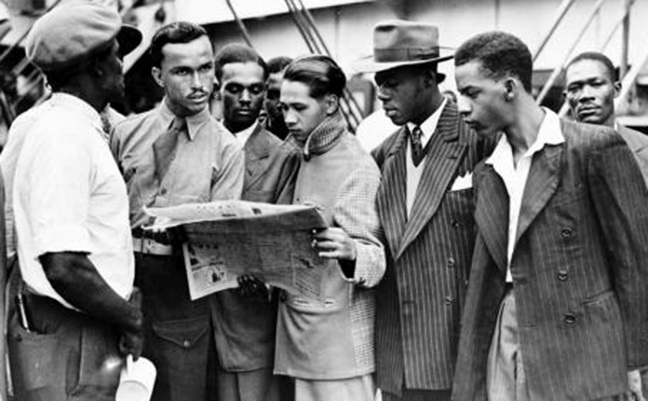We’ve been thinking about this year’s communion service for a few years now. We wanted to continue the thread of the last two years’ focus on inclusion – of children in 2016 and of those with additional access needs last year. In particular, we have wanted to have a service focussed around black experience and black identity at the festival (a festival we recognise is very white).
So, after much thinking, this is what we are going to attempt this this year – a year of key anniversaries which focus our hearts and minds on the experience of people of colour, both here in Britain and the world over: 70 years since the arrival of the Empire Windrush at Tilbury Docks carrying the first wave of Caribbean immigrants to the UK in 1948; 50 years since Martin Luther King’s assassination in 1968; 50 years since Enoch Powell’s “Rivers of Blood Speech” in 1968; 40 years since Rock Against Racism was founded and hosted its first gig here in the UK in 1976; and 25 years since the murder of black teenager Stephen Lawrence in 1993.
At the beginning of the New Year, and after much reflection, we chose to build this year’s service especially around the Windrush story – not least because we had been delighted to work on ideas for the service and early drafts of the liturgy with Michael Jagessar, Head of Intercultural Ministries at the United Reformed Church, and of Caribbean descent.
Here’s the vision for the service …
Windrush
On 22nd June 1948 HMT Empire Windrush docked at Tilbury in East London and its 493 passengers disembarked. Hundreds of Caribbean men and women had crossed the Atlantic. Some were coming to join the British armed forces; others wanted to establish new lives in “the mother country”; one was a stowaway!
The world was recovering from the Second World War. In the UK, work was plentiful but housing wasn’t. The “Windrush generation” found themselves excluded from much of the social and economic life of Britain. Many experienced horrific racial violence and injustice. They exposed depths of prejudice in British culture including – and perhaps especially – in British churches.
Carnival
Part of their response was to regroup around aspects of Caribbean culture including music, worship and community organising. One aspect of that culture was carnival. Since the mid-60s the Notting Hill Carnival has brought colour and joy to the grey streets of West London. It is one of the largest street festivals in the world. And, while it clashes with Greenbelt almost every year in terms of dates, carnival has a lot of resonance with us in other ways.
In Medieval times, carnival both parodied the oppressive structures of the day and dramatically portrayed an alternative reality. In many ways the Notting Hill Carnival picked up this dynamic. Carnival is colour and music, but it is also subversion – an enacted rebellion – shouting in the face of authority, saying loud and clear that there is a place where the sun shines and laughter and justice reign. Without denying the reality of pain, injustice and oppression, carnival paints a picture of another possibility. In Marijke Hoek’s book Carnival Kingdom she describes how the first Christians sought to live out a new social order and envisaged a renewed world – but they did it in the middle of the constraining, oppressive forces of the day. We are them.
April 2018 also marks 50 years since the assassination of Martin Luther King Jr. MLK’s work was oriented toward the creation of a community characterized by love and justice, a vision of society he called “the Beloved Community.”
Colour
The occupation and dehumanizing of black bodies continues, of course, but so does our striving towards “the Beloved Community.” A dream, maybe? But what better place to dream than around our ‘common table’ where a meal is insurgency, subversion, and hope at work? And what better way to do it than by a dancing, singing, laughing celebration of colour?
This year Greenbelt’s Festival Communion has been ‘crafted’ especially for us, largely by people of colour.* We will share worship from an intercultural perspective, largely mindful of BAME minority voices and traditions while at the same time expansive enough to reflect solidarity with all those who are forced to dwell on the edges in our liturgical life. We will draw on songs and words from the Caribbean, Nigeria and from the spirituals of the African-American tradition. We will be led by sisters and brothers of faith and colour from all over the world. Like the first disciples of Jesus, huddled in an upper room, looking out at a hostile and hardening culture, we will feel the Wind-rush of God’s multi-coloured Spirit as we imagine and enact another world. We will celebrate carnival.
*Please come wearing bright colours, and bring something (or someone) that will make lots of noise.
Our thanks for wisdom and counsel in helping us craft this service over many months (if not years) now go to:
Michael Jagessar, Head of Intercultural Ministries at the United Reformed Church
Anthony Reddie, Extraordinary Professor of Theological Ethics at the University of South Africa
Chine McDonald, Greenbelt Trustee and Head of Christian influence & Engagement at World Vision
The service will include contributions from Winnie Varghese, Chine McDonald and Evie Vernon. Plus many more!
(And Andrew Graystone is once again working with us to produce the actual service as an event. Our thanks go to him.)
Our music will be led on the day – and after in a gospel set – by last year’s hit sensations Soul Sanctuary Gospel Choir.


